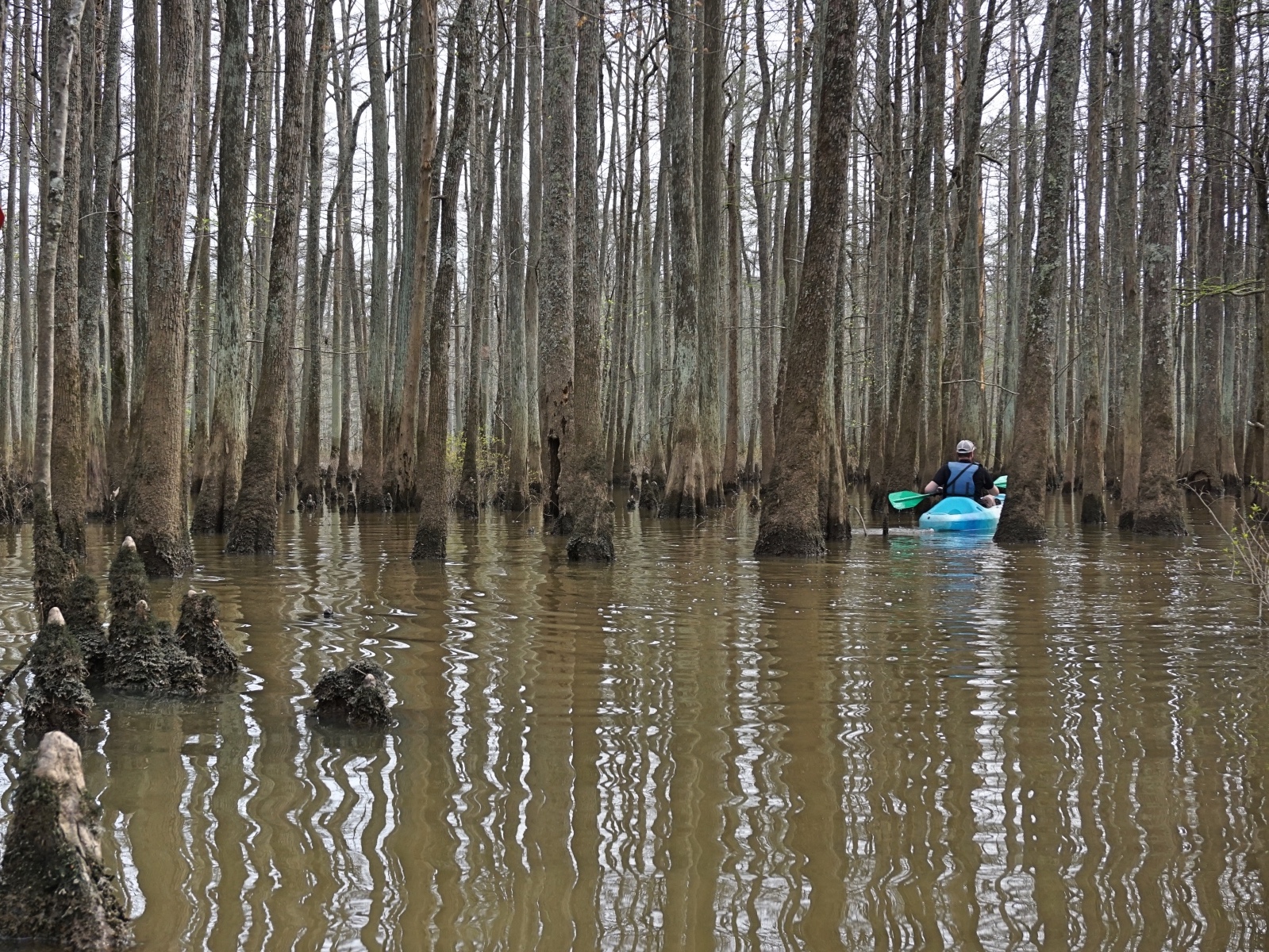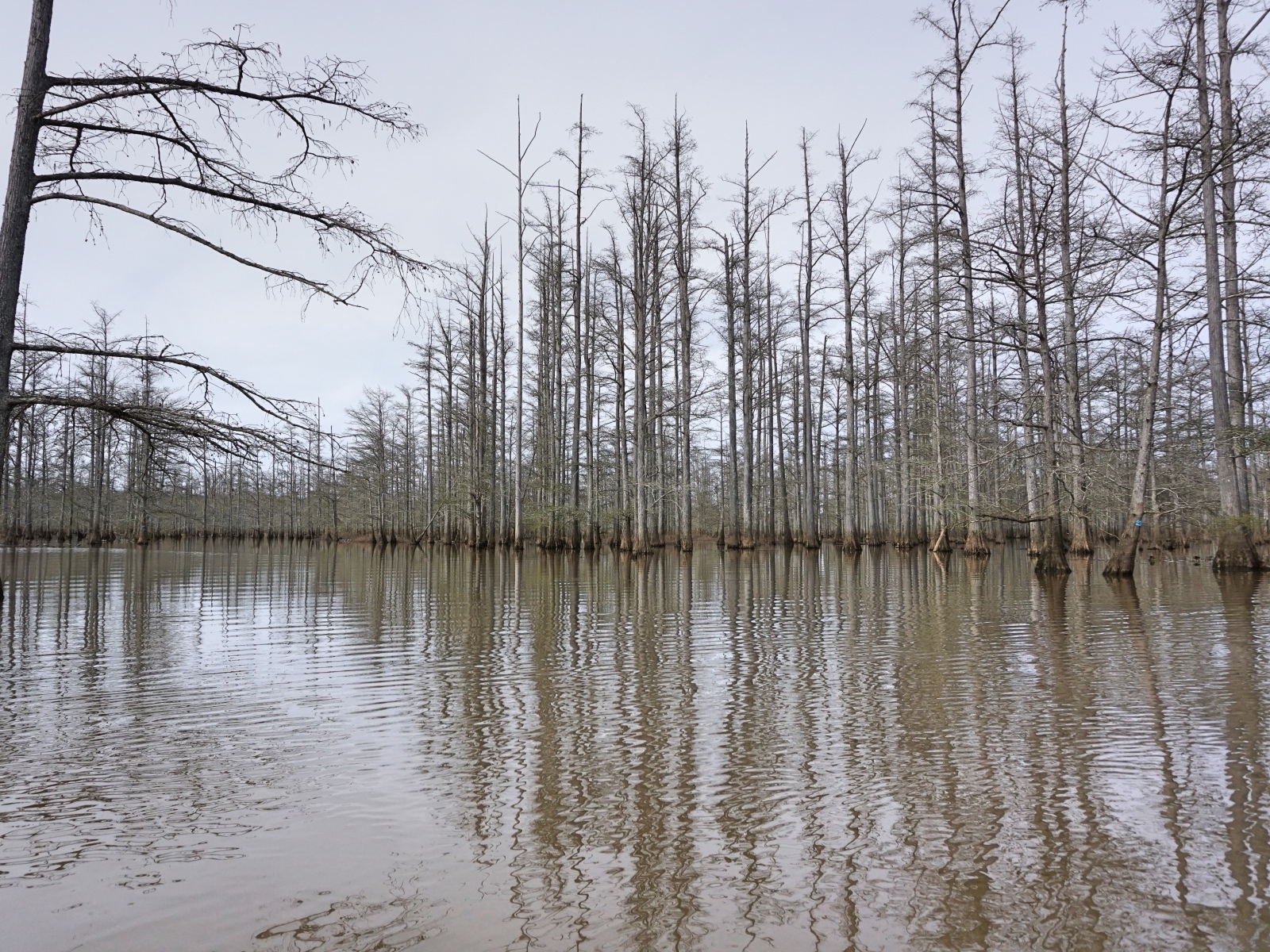Paddling With Ghosts in Tennessee

My arms burned each time I plunged a paddle blade beneath the surface of the river, pulling myself toward whatever I might find ahead. This five-hour kayak journey down Tennessee’s Wolf River traverses a cypress swamp crossed by channels and tributaries that lure paddlers down their path, only to disappear into the landscape, earning this ecosystem an eerie name: the Ghost River Section. I had carried my ghosts for years; I brought them into the swamp with me.
My father loved to canoe and traveled with a group of men to the Boundary Waters, a million-acre wilderness in northern Minnesota. He came back to our home in Indiana with rolls of film to develop, most with pictures of still water, spruce trees or a solitary moose, but my favorite were the loons.
As a child, I couldn’t imagine anything so exotic, with their black-and-white feathers and garnet eyes. When he played footage from the trip, I knew I would never forget the sound of their wild and mysterious call.
There were always a few pictures showing my father’s friends, who were married to my elementary school teachers or members of our church, making silly faces or laughing at someone just out of frame. These pictures were a glimpse into a forbidden world where the men told bawdy stories I wouldn’t be allowed to hear.
He returned an evangelist from his first trip, determined to share his watery gospel with my mom, brother and me, so he planned a family canoe trip at a nearby state park. He coached us on strategy, showing us how to hold the small souvenir paddles he’d bought for us at a gift shop.
We rented two heavy green canoes, with dusty life jackets and scuffed plastic oars. The creek, we quickly realized, was nearly dry. The canoes scraped across the pebbled bed until my father would call out that it was time to carry the boats.
“Is this a portage?” I asked, remembering how he and his buddies had hoisted their canoes overhead and hiked through the brush.
“No,” he said, brusque and exasperated. “This isn’t how it is.”
I kept quiet about the heat and how the oar was hurting my hands and tried to prove I was as capable as those men who knew what a real portage felt like, but we never canoed together again.
When I was 17, he returned to the Boundary Waters with those same men. Two months after his return, he died in an unexpected instant. He didn’t know he would never again feel his oar break the water’s surface; he didn’t hear any foreboding significance in the cry of the loons.

I didn’t intend for my trip to Tennessee to be a pilgrimage, but as I saw the row of kayaks and canoes lined up to be launched into the Wolf River, I remembered that hot day at the state park when I felt like I failed my father.
Mark Babb, owner of Ghost River Outfitters, pointed to the kayaks and told me again to jump into whichever one I wanted. He and Jim Gafford, from the Wolf River Conservancy, were leading a small group of us down the 9-mile stretch between LaGrange and Moscow, Tennessee, where the silt-stained waters travel through five ecosystems, including the Ghost River Section.
I hung back until Babb and another man helped me into a kayak and pushed me into the river. Gafford sat solo in his canoe, with a white beard that rested on his chest. These men knew the river like a good friend, and they were at ease in their boats. I began to paddle hard, worried I wouldn’t keep up. Each time I dipped one blade into the river, the other flooded my lap with cold water.
Another paddler glided his kayak beside mine as I grimaced about my technique. “A lot of people think you have to lift up the paddle and dig, dig, dig,” he said, “but the trick is to keep it low and steady.”
The current was calm enough to hear a woodpecker drilling in the distance, and I practiced steering against it. I steadied my breathing, hoping to quiet my fears: we had five hours to go with portages ahead. I spent so many years hedging, afraid to push myself and then fall short, but now I was already on the river; the only thing left to do was paddle.
I followed behind Gafford, working to keep my paddling low and steady, listening to him point out a bush that would bloom scarlet later in the year and naming bird species by memory after claiming he wasn’t much of a birder. The day was pleasant, with sunlight filtered through the trees. I began to build a rhythm.
Before I had fully relaxed, we reached the first of several downed trees blocking our path. The current felt fast and unpredictable as I tried to steer towards the shoreline and avoid other people’s boats. I smacked against another paddler, and Babb reached out to grab my kayak.
“Sorry, sorry!” I said, feeling the first blush of shame.
“No problem,” assured the other kayaker, in a gentle tone. He hopped out onto shore and began pulling his kayak without pause. Babb cut a few errant branches from the fallen tree, clearing our way to shore.
“I was just wondering how many Band-Aids you go through in a year,” I said.
He smiled. “I’ve given up on Band-Aids,” he said, tossing his saw back into the front of his kayak and helping me up. My unsteady feet caught in the mud, and I tripped, grabbing onto a tree for balance. Babb had already pulled my kayak around the tree and positioned it for launch on the other side.
I realized then that none of these men doubted me. They weren’t waiting for me to fail: they were waiting for me to get back into my kayak so we could continue down the river together.
We continued through bottomland hardwoods and scrubby wetlands until we reached an unassuming sign hand-painted bearing the words “Turn Here” and an arrow pointing left. We were entering the Ghost River Section.
What had been a river flowing gently between its banks widened into a maze of cypress and water tupelo trees. Blue herons swooped and landed where we could barely see their dusty blue outline. Our loud laughter turned to reverent whispers amidst the slap of paddle blades against the water.
The cypress had just begun to push their needle-like leaves. In the summer, this swamp must be warm and green, like a pine forest soaking its roots to cool off. In early spring, the bare branches and thin trunks that widen at the base were other-worldly. We navigated between the trees, avoiding the cypress knees that poked above the water.
So many travelers before us had been fooled by channels inviting them to turn a corner, only to disappear into the reeds. But we had guides who wanted to share the river with us, no matter how choppy my paddling, how clumsy my portages.
The swamp opened into a broad lake, with no current to urge us along. My fellow paddlers in the group began to stretch their forearms, circle their wrists and check for blisters. These men were more experienced than me, and their navigation was more graceful, but I could keep up. My muscles ached, but determination welled up to replenish my will to keep paddling, low and steady.
The lake narrowed into the river once more, and we leaned back to stretch out over our kayaks, warmed by the sun and the promise of the home stretch. We reached the end of our journey tired and triumphant. I must have felt how my father did as he reached the shore to set up camp with his friends, telling forbidden stories for laughs, listening for the call of the loons.

/
 Jessica Dixon is a writer living in Denver, Colorado. She loves traveling around the U.S. and abroad but is always happy to get back home, where you can find her hiking with her dog, Bella. Her work has appeared in publications including Indianapolis Monthly, Westword and Real Food Traveler. Read about more of her adventures at www.rockymthi.wordpress.com.
Jessica Dixon is a writer living in Denver, Colorado. She loves traveling around the U.S. and abroad but is always happy to get back home, where you can find her hiking with her dog, Bella. Her work has appeared in publications including Indianapolis Monthly, Westword and Real Food Traveler. Read about more of her adventures at www.rockymthi.wordpress.com.
